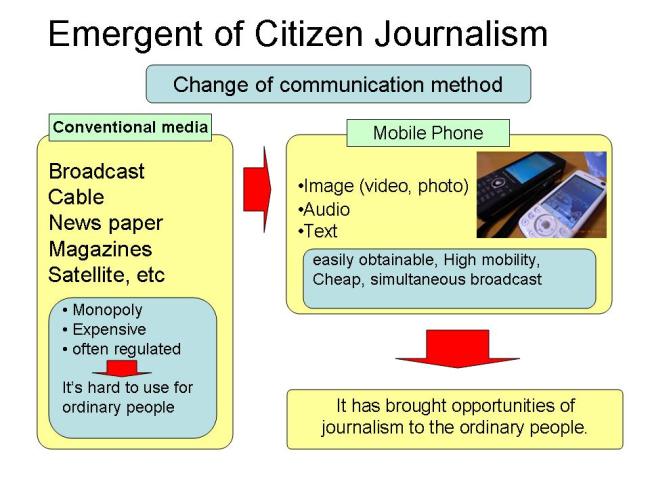Giving a voice to the voiceless is now brought up as a trend of social media where people, formal or informal journalists, comment, talk and share about a particular thing or issue while press are mediated (Franklin, 2009). It is now no longer a habit for people to read up the newspaper and search information of an issue or news, which is now sometimes to be decided for the choices of obtaining information around the world and leaving traditional journalism behind as the rapid growth of Internet hit the world. Despite the change of technology, citizens play a role of its changes from media convergence that in fact it indicates a new way of processing news by participations (Kolodzy, 2006). Citizen participation, or citizen journalism is labelled by the processing from collecting, reporting, analysing and spreading news and information from a group of people who are in involved in an event with advance technology provided widely.
According to Peter Dooley, citizen journalism is a place for emerging phenomenon whereas journalists who has been practised for profession as traditional journalism. On the other words, citizen journalism is the people who are not having professional training in journalism and use the social media tools as a platform to provide news such as blogs, forums, video and photographs.
An argument was stated that the outside looking in is for traditional journalism, the inside looking out is for citizen journalism (Dooley,2008). There was a good example for demonstration as proof for Dooley’s argument that the Jamaica’s three-free-air CVM television, it allows convenience for people to send and share reports through I-Watch report segments of events and activities. Since eighteeth century, citizen journalism existed as a new form of journalism by accessing to media communication tools to make their opinion heard widely- voices to the voiceless. Referring to the research, substantial changes have been found in social, economic affairs and political in the year 2001 of the incident of 9/11.
Indeed, some valuable content could be found through emails, chat groups, personal web journals- those all provided by informal journalists while the professionals could not provide (Gillmor,2004). Nevertheless, it shapes the scope of journalism where it is now available to the new scopes, general, politics, economy, crime, sports and entertainment. For example, all these scopes of journalism were covered within its own country but it is worldwide. It was a greatly supportive example that the New York, Wall Street Journals, provides information about the Malaysia’s politics where Prime Minister Mahatir Mohammad was confident to preserve his own two-thirds majority in parliament seats because of some ethics issues from parties yet it explained further of reason for reforming PAS, the Islamic party, by Anwar to proves its ability of governing control of the country in the 1980s and 1990s. In addition, BBC Monitoring Asia Pacific from London reported that Anwar Ibrahim, PKR is confident that it is able to deliver 25-30 parliament seats. It was clearly shown that its text reports are to credit MalaysiaKini website as a proof that change in political has led to the scope of new journalism.
All in all, citizen journalism is a part of need in journalism where it has to be needed to refer and gain more feedback or information that is taken by the people who are involved in an event while the professionals might not be able to capture or collect some particular or detailed information that the informal journalists have. With the advent of technology, it allows more accessibility through Internet to an event of collecting information or news from the outside and inside. However, Internet is the key for journalism in today.
How?
References
Barnes.C, Citizen Journalism vs Traditional Journalism: A Case for Collaboration, University of West Indians, Carribean Quarterly 2008, Vol 58, page 16-27,179, June-September 2012, assessed at < http://ezproxy.uow.edu.au/login?url=http://search.proquest.com.ezproxy.uow.edu.au/docview/1237145950?accountid=15112>
Kolodzy, J. (2006). Convergence Journalism: Writing and Reporting Across the News Media. Lanham: Rowman & Littlefield, Inc.
Gillmor, D. (2004). We the Media: Grassroots Journalism by the People, for the People. Sebastopol, CA: O’Reilly.
Franklin, B. (2009). The Future of Newspapers. London: Routledge.
Peter Dooley, The Technology of Journalism: Cultural Agents, Cultural Icons (Evanston, IL: Northwestern University Press, 2008), 83.
Anwar.S. et.al, Role of Citizen Journalism in Strengthening Societies, FWU Journal of Social Sciences 2011, Vol 5, page 88-106, assessed at <http://ezproxy.uow.edu.au/login?url=http://search.proquest.com.ezproxy.uow.edu.au/docview/904638083?accountid=15112>
Dotcom.M, Malaysia’s Anwar confident of denying ruling coalition two-third majority, BBC Worldwide Limited, Feb 21, 2008, assessed at <http://ezproxy.uow.edu.au/login?url=http://search.proquest.com.ezproxy.uow.edu.au/docview/460861205?accountid=15112>
A Changing Malaysia; Acquitting Anwar clears the way for reform of UMNO and the country,Wall Street Journals, Dow Jones & Company Inc, New York , Jan 10,2012, assessed at <http://ezproxy.uow.edu.au/login?url=http://search.proquest.com.ezproxy.uow.edu.au/docview/914717539?accountid=15112>

